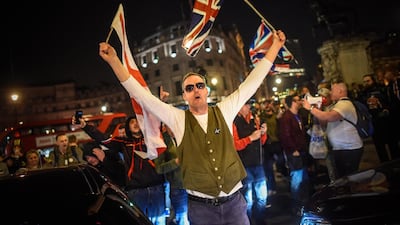Over the past few months, as Britain hurtled towards March 29, its proposed deadline to leave the European Union, I found myself imagining a uniquely Northern Irish scene.
Large white wind turbines rotated on a bracken-covered mountain ridge. Teenage boys were playing football on a grassy pitch in the foreground. Two men watched from a car, smoking cigarettes and talking.
“It’s a British state again, no question,” one told the other. “Our lads won’t have time for peace any more. Our time is coming…”
Britain did not leave the European Union on Friday night. But, had it done so, similar conversations would surely now be happening.
With an extension of the deadline secured from Brussels and parliament in disarray, some of the most committed Brexiteers pulled back from the absolutist positions they had previously taken.
Nigel Dodds, the deputy leader of the Northern Irish Democratic Unionist Party – the group upon whom Theresa May has been forced to rely, in order to pass legislation in a hung parliament – sunk the prime minister’s third attempt to secure approval of her withdrawal agreement with Brussels.
Outlining his party’s stance, he said: “I would stay in the European Union and remain, rather than risk Northern Ireland’s position.”
He referred to Northern Ireland’s place in the UK, which could be in jeopardy. Under the 1998 Good Friday Agreement, Northern Irish residents have the right to vote on uniting with the rest of Ireland. The Northern Ireland secretary is also obliged to call a border poll if they believe a majority would vote for unification. This option is now seen by some as a means to preserve their European rights.
Other high-profile Brexit advocates shifted as well. Just a week after comparing his efforts to leave the EU with the biblical escape of Moses from pharaonic tyranny, Boris Johnson fell in line behind Mrs May. As did Jacob Rees Mogg, another Old Etonian high priest of Brexit.
As their figureheads folded, hard core Brexit supporters gathered in central London on Friday to protest what they view as a betrayal. The failure of the government to deliver the UK’s departure from the European Union on schedule, as Mrs May has promised more than 100 times in public speeches, prompted a howl of outrage.
The rallies opened a window on a grim future.
The right-wing extremist known as Tommy Robinson – real name Stephen Yaxley Lennon – took to the stage at an event organised by UKIP, the party that can fairly claim to have provoked the 2016 referendum. In an erratic speech, he focused not on the shortcomings of the EU but on Islamophobic ranting, sketching out his agenda for post-Brexit Britain.
The BBC later referred to him as an “anti-Muslim activist”, as if that is somehow normal now.
Brexit is a new chapter in British history and could still happen, with no deal in place, on April 13, if MPs cannot reach consensus. The British Isles are defined by relationships between four constituent parts – England, Scotland, Wales and Northern Ireland, the latter of which was created when the rest of Ireland achieved independence from the Crown in 1921.
The Conservative Party has operated within and arbitrated between these territories since its foundation in 1834. Now that Mrs May has promised to step down, the battle for its leadership will dominate the months ahead.
Rising barriers to trade between Britain and Europe would create a parallel drumbeat of crisis.
In a public relations coup, the French port of Calais unveiled a streamlined system for lorry traffic between the UK and the EU last week. Cannily, it painted the lines green (the colour of free passage) and orange (not red, but an intermediate colour denoting a streamlined approach).
However, if these issues are not ironed out, British newspapers will be filled with headlines warning of medicine shortages, food rationing and general chaos.
Meanwhile, the threat posed by Labour under Jeremy Corbyn’s leadership will only grow, if parliament’s fractures widen.
The Irish border has been the litmus test of Brexit. It has proven an unexpectedly important and complex obstacle to a smooth departure from the EU. Now, the wryly humorous Twitter account @BorderIrish is a reference point in negotiations between London and Brussels.
The EU provided a common platform for all the communities of Britain and Ireland to overcome historic divisions. Since a 2014 referendum rejected the idea of Scottish independence, the same is also increasingly true of the ties between Edinburgh and Westminster.
Mounting instability gives hardliners openings that they will be keen to exploit. Radical Irish republicans and loyalists have not gone away. Most have leveraged their community standing – some probably holding court at football games in the shadows of the mountains – for illicit financial gain.
A broken Irish border will create new opportunities for them. The post-Brexit capacity of the British state to police this situation was also questioned by one of the most senior policemen in Belfast last week. Temporary Assistant Chief Constable Tim Mairs told a seminar that the border could become a “criminal safe haven” if the current set-up is dismantled.
If Saturday had been the first day of Brexit Britain, such figures – along with extreme-right-wing ideologues – would have been the coming men. As it is there is still a chance that we may be able to agree a Brexit in which that does not happen. Let’s hope we do.

